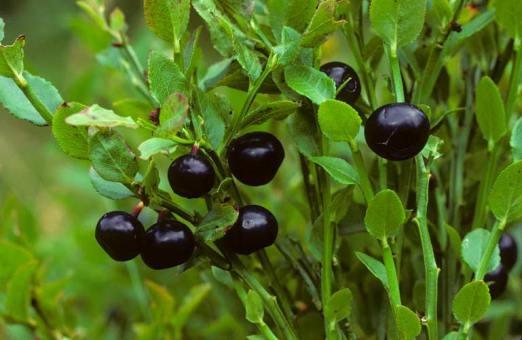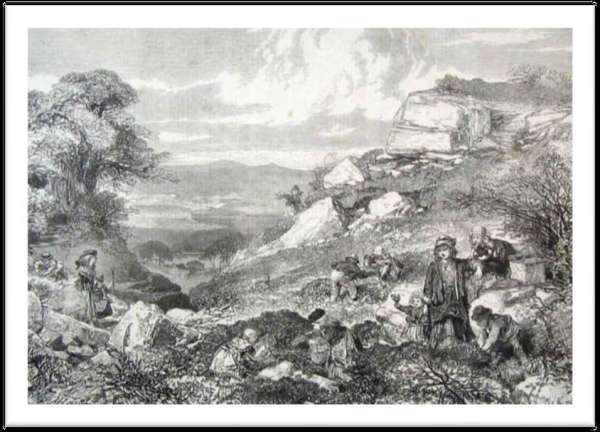Highland Fairy Lullaby è una ninna nanna delle Highland scozzesi, il lamento di una madre che ha smarrito il suo bambino nel bosco. Teme che sia stato rapito dalla fate poichè l’aveva lasciato incustodito nella sua culla, posandola accanto ad un cespuglio di bacche selvatiche. Nella canzone si descrive una ricorrenza sociale ancora sporadicamente praticata in Scozia e Irlanda: la raccolta dei mirtilli, una festa di mezz’estate denominata Bilberry Sunday (in Scozia si dice “Blaeberry” in Irlanda “Fraughan”).
[English translation]
A Scottish Highland lullaby is the lament of a mother who has lost her baby in the woods. She fears that he was kidnapped by the fairies because she had left him unattended in his cradle, laying next to a bush of wild berries. The song describes a social occasion still sporadically practiced in Scotland and Ireland: the harvest of blueberries, a midsummer party called Bilberry Sunday (in Scotland they say “Blaeberry” in Ireland “Fraughan”).
BILBERRY SUNDAY
La domenica del Mirtillo si celebrava per lo più a luglio, quando maturano le bacche del mirtillo o ad Agosto, spesso abbinata alla festa celtica di Lughnasa o alla domenica (o lunedì) più prossima alla festa: giovinetti e giovanette stavano su per i monti nella brughiera da mattino a sera a raccogliere i mirtilli e a fare amicizia, era perciò una festa dedicata al corteggiamento e a combinare i matrimoni (sotto i buoni uffici di Lugh). Alla fine della giornata le donne da marito avrebbero preparato una torta con i mirtilli raccolti, da regalare durante la festa successiva, al ragazzo di cui erano innamorate e se il ragazzo accettava il dolce si poteva dichiarare iniziato il corteggiamento.. (altro che festa di San Valentino!!)
Sconosciuto nelle civiltà mediterranea antiche, [il mirtillo] è una creatura delle montagne settentrionali, che entrò a far parte del repertorio medico medievale, quando si scoprirono le sue virtù astringenti, toniche e depurative. Anche i medici del ‘700 lo consigliavano per “moderare l’ardore di una bile infiammata”. I mirtilli, come le more o i lamponi, sono il miglior pretesto per riunirsi in allegra compagnia e recarsi cantando nei monti. E’ per cosi dire un frutto “sociale”.
Nella tradizione estiva della montagna, c’era la “domenica del mirtillo”, giorno dedicato alla frivolezza, quando i giovanotti e le fanciulle muniti di secchielli, dovevano raccogliere i frutti, e invece si dedicavano agli amoreggiamenti e alle danze. Chi raccoglieva i mirtilli erano le madri, che poi li utilizzavano per fare marmellate. (tratto da qui)
Si raccoglievano grandi quantità di mirtilli non solo per fare le torte e le confettura ma anche a scopi medicinali e per le tinture; nel Donegal erano i ragazzi a confezionare i braccialetti con i mirtilli (non dimentichiamoci che un tempo -ad esempio il Settecento – gli uomini avevano molta più dimestichezza di ago e filo di quelli di oggi!) da regalare alla ragazza di cui erano innamorati.
La Valle d’Aosta è piena di mirtilli selvatici basta andare per i sentieri di montagna nel mese di luglio-agosto o approfittare di una sagra del mirtillo !
La festa di Lughnasa era perciò una festa delle alture in cui si iniziava il primo raccolto, quello dei frutti spontanei ovvero si propiziava la stagione del raccolto, una raccolta abbondante di bacche avrebbe infatti significato una buona annata per i raccolti successivi.
Era anche l’occasione per fare un pellegrinaggio sulle alture (da tempo immemori considerati luoghi sacri).
It celebrated mostly in July, when the berries of the blueberry ripen or in August, often during the Celtic festival of Lughnasa or on Sunday (or Monday) closer to the feast: young boys and girls went to the moor from morning to evening, to pick blueberries and make friends, it was therefore a celebration dedicated to courtship and combining marriages (under Lugh’s name). At the end of the day, the maidens would have prepared a cake with the collected blueberries, to give as a present for the next party, to the boy they were in love with.

They were harvested large amounts of blueberries not only for making cakes and jam but also for medicinal purposes and for dyes; in Donegal it was the boys who made the bracelets with blueberries (let’s not forget that once – for example the eighteenth century – men were much more familiar with needle and thread than today!) to give to the girl they were in love with.
Lughnasa was therefore a festival of the heights in which they began the first harvest, that of the spontaneous fruits to propitiate the harvest season, an abundant collection of berries would in fact have meant a good year for subsequent harvests.
It was also an opportunity to make a pilgrimage on the heights (which have long been seen as sacred places).

HIGHLAND FAIRY LULLABY
In Scozia non mancano altri esempi di ninna-nanne “spaventevoli”, indirettamente la mamma dice al bambino “fai il bravo e dormi altrimenti ti portano via le fate”!
La nenia è dolce ma il testo è angosciante con la mamma che cerca ovunque il suo bambino…
Il testo originale in gaelico scozzese con rigo musicale è stato trasposto in inglese da Lachlan MacBean e pubblicato nella raccolta “The Celtic Lyre” di Henry Whyte, 1883 con il titolo “An Cóineachan” (in inglese The Fairy Lullaby) -# 56 (qui)
Frances Tolmie riporta ulteriori strofe in One Hundred and Five Songs of Occupation from the Western Isles of Scotland (Journal of the Folk Song Society, no. 16, 1911) con il titolo “An Cùbhrachan” (in inglese “The sweet little one”) come collezionate da Janet Anderson, Contin Manse, Ross-shire, 1870
“O, I walked the hill from end to end,
From side to side, to the edge of the becks,
O, I walked the hill from end to end,
I did not find my Cùbhrachain.
I heard the curlew crying far,
Crying far, crying far,
I heard the curlew crying far,
But never heard my baby-o.”
[English translation]
In Scotland there is no lack of other examples of “frightening” lullabies, indirectly the mother says to her child “Be good and sleep otherwise the fairies will take you away”! The lullaby is sweet but the text is distressing with the mother looking for her child everywhere .
The original Scottish Gaelic text with musical line was transposed into English by Lachlan MacBean and published in the collection “The Celtic Lyre” by Henry Whyte, 1883 with the title “An Cóineachan” (in English The Fairy Lullaby) – # 56 (here )
Fhuair mi lorg na lach air an lòn,
Na lach air an lòn,
Na lach air an lòn
Fhuair mi lorg na lach air an lòn,
Cha d’fhuair mi lorg mo chubhrachain
Hovan, Hovan, Gorry og, O
Gorry og, O
Gorry og, O
Hovan, Hovan, Gorry og, O
Cha d’fhuair mi lorg mo chubhrachain
Fhuair mi lorg an laoigh bhric dheirg…
Fhuair mi lorg and eich’s a phairc…
Fhuair mi lorg na bà’s a pholl…
Fhuair mi lorg na caorach geala…
Fhuair mi lorg a cheo’s a bheinn…
[English translation]
I found the track of the duck on the pond,
on the pond, on the pond
I found the track of the duck on the pond,
I found no track/trace of my fragrant wee one
CHORUS nonsense
I found the track of the mottled, russet, young deer…
I found the track of the horse from the meadow…
I found the track of the milk cow from the pool…
I found the track of the white sheep…
I found the track of the mountain mist…
Frances Tolmie collected further stanzas in One Hundred and Five Songs of Occupation from the Western Isles of Scotland (Journal of the Folk Song Society, No. 16, 1911) with the title “An Cùbhrachan” (in English “The sweet little one”) from Janet Anderson, Contin Manse, Ross-shire, 1870
I I left my baby lying here, lying here, lying here; I left my baby lying here to go and gather blaeberries o. Chorus: Ho-van, ho-van gorry o go, gorry o go, gorry o go; Ho-van, ho-van gorry o go, I lost my darling baby o. II I saw the wee brown otter’s track, Otter’s track, otter’s track, I saw the wee brown otter’s track, But never found my baby-o. III I saw the swan upon the lake upon the lake, upon the lake I saw the swan swin on the lake but never saw my baby, O! IV I searched the moorland tarns and then, Wandered through the silent glen, I saw the snow (mist) upon the ben, But never found my baby-o. | Traduzione italiana di Cattia Salto I Ho lasciato il mio bambino, sdraiato qui sdraiato qui, sdraiato qui Ho lasciato il mio bambino, sdraiato qui per andare a raccogliere i mirtilli(1). CORO Ho-van, ho-van gorry o go, gorry o go, gorry o go; Ho-van, ho-van gorry o go, ho perduto il mio caro bambino II Ho visto le tracce della lontra bruna, le tracce della lontra, ho visto le tracce della piccola lontra bruna, ma non ho più trovato il mio bimbo III Ho visto il cigno sul lago, sul lago, sul lago ho visto il cigno che nuotava sul lago, ma non ho più visto il mio bambino. IV Ho cercato nei laghetti(2) della brughiera, vagando per la valle silenziosa, ho visto la neve (la nebbia)(3) sulle cime dei monti(4) ma non ho mai trovato il mio bambino. |
NOTE
1) blaeberries= bilberries, blueberries. Blackberries sono invece le more. Il mirtillo selvatico contrariamente alle more è una pianta strisciante e forma bassi cespugli (10-30 cm) ed è blu scuro, la varietà rossa è detta in inglese cranberry.
2) tarn= small mountain lake
3) dice neve perchè può capitare in Scozia che a luglio sui monti nevichi!
4) ben= mountain
Silene
I
I left my baby lying here,
lying here, lying here;
I left my baby lying here
to go and gather blaeberries.
Chorus:
Ho-van, ho-van gorry o go,
gorry o go, gorry o go;
Ho-van, ho-van gorry o go,
I never found my baby o.
II
I saw the little yellow faw,
The yellow fawn, the yellow faw:
I saw the little yellow faw,
But never saw my baby, O!
III
I tracked the otter on the lake
on the lake, on the lake, on yonder lake
I tracked the otter on the lake,
but could not tracked my baby o
CHORUS
O! Hovan, Hovan Gorry og O,
Gorry og, O, Gorry og
O, Hovan, Hovan Gorry og O
I’ve lost my darling baby, O!
I
I left my baby (darling) lying here,
a lying here, a lying here,
I left my baby (darling) lying here,
To go and gather blaeberries.
II
I’ve found the wee brown otter’s track,
the otter’s track, the otter’s track
I’ve found the wee brown otter’s track
But ne’er a trace o’ my baby, O!
III
I found the track of the swan on the lake
the swan on the lack, the swan on the lake
I found the track of the swan on the lake,
But not the track of baby, O!
IV
I found the track of the yellow fawn, the yellow fawn
I found the track of the yellow fawn,
But could not trace my baby, O!
V
I found the trail of the mountain mist,
the mountain mist, the mountain mist
I found the trail of the mountain mist,
But ne’er a trace of baby, O!
LINK
http://www.thecelticjunction.com/mission/newsletter/issue-9-lughnasa-2013/
http://www.taccuinistorici.it/ita/news/medioevale/orto-frutti/Mirtillo-gioiello-del-bosco.html
http://www.contemplator.com/scotland/fairylul.html
http://mudcat.org/thread.cfm?threadid=59163
http://mudcat.org/thread.cfm?threadid=77643
http://mudcat.org/thread.cfm?threadid=1005
http://www.mamalisa.com/?t=es&p=3495
http://www.academia.edu/1536150/The_Celtic_Lyre
http://www.bilberrytart.co.uk/2012/09/welsh-cakes.html
